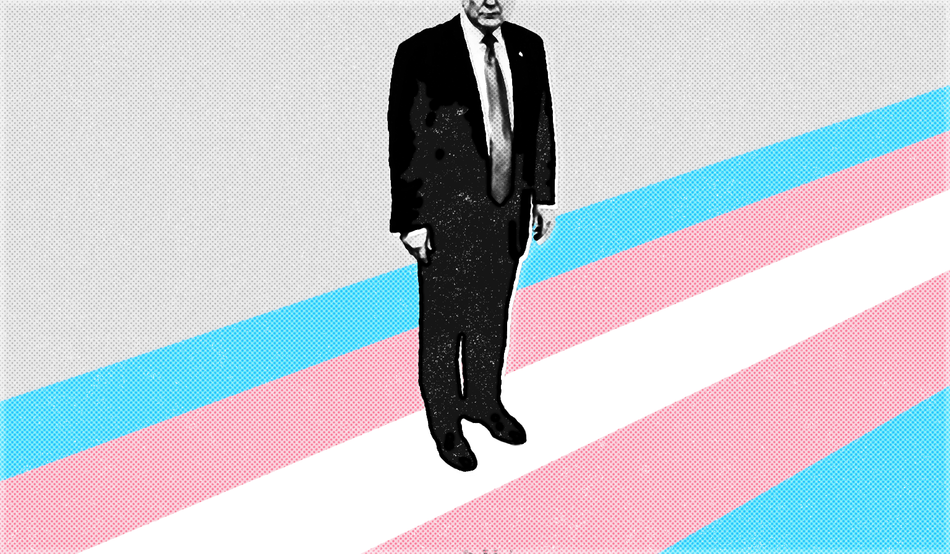Donald Trump’s first term brought misery to the transgender community in the United States. He successfully banned trans people from serving in the US military and overturned healthcare protections for trans people brought in by Barack Obama, as well as trans people’s right to access bathrooms and changing rooms that aligned with their legal sex.
Since 2020, towards the end of Trump’s first term, a flurry of anti-trans bills has been introduced in states across the country. This continued throughout Joe Biden’s time in office, including bills that targeted trans people in sports and a Florida bill banning the discussion of sexual orientation and gender identity in classrooms. In Ohio, a bill was passed allowing doctors to inspect the genitals of under-18 girl athletes—note that this was targeted specifically at girls—who were suspected of being transgender, to try to determine their sex assigned at birth.
But if Trump’s first term was disastrous for the American trans community, then his second has been cataclysmic. Less than a year in, for people who are transgender the US has become the land of the unfree.
Trump has reintroduced his policy, overturned by Biden, of banning transgender people from serving in the US military. And he has gone much further. His “One big, beautiful bill” originally attempted to remove coverage for transgender healthcare that is currently ensured under the Affordable Care Act. However, this provision was later dropped because it violated a Senate rule.
Another Trump executive order has forced passports to list sex assigned at birth, rather than legal sex, targeting both transgender and intersex people—an order that has since been overruled by the courts. He has signed an executive order banning trans women from women’s sports, which they arguably aren't anymore, given that one group of women are banned from participating.
Kit, a transgender director who lives in LA, says that he’s scared to leave the US because he isn’t sure if he’ll be allowed back in. “Under the radar, [Trump] won’t let anyone who has a ‘fraudulent’ passport [one that doesn’t align with sex assigned at birth] into the country.”
Susan Stryker, an American historian and author of Transgender History, says she is very pessimistic about the future. “I think in the so-called red states, things will continue to be very bad for trans people, particularly trans kids, families with trans kids and service providers who provide care for trans kids,” she tells me. “That’s not going to change any time soon.”
Trans people have always existed. But they have not always been in the crosshairs of public debate. The trans community was crucial to the fight for equality for gay, lesbian and bisexual people, playing a leading role in the Stonewall Riots of 1969, which began in protest at a series of police raids on the Stonewall Inn, a gay bar in New York City. The organised civil rights movement for trans people has been gaining momentum since the 1990s. A big moment was the publication of Judith Butler’s book, Gender Trouble (1990), in which the philosopher argued that a distinction should be made between sex and gender, on the grounds that gender is a social construct—as opposed to sex, which is determined by biology.
One common tactic of the anti-trans right has been to try to erase transgender history and to attempt to remove the “T” from the LGBTQ+ community. In February, the US National Park Service removed all references to the role of trans people in the Stonewall Riots from the Stonewall Memorial’s website. Yet trans people were just the first targets: later on, the Trump administration also expunged all references to bisexual people.
Similarly, in June, the secretary of defence, Pete Hegseth, renamed a frigate that had been named after Harvey Milk, the legendary gay rights campaigner assassinated while serving on the San Francisco Board of Supervisors. In 1955, Milk was “other than honorably” forced to resign from the US navy, under threat of court-marshal, for the then crime of being gay, in spite of his service during the Korean War.
Hegseth insisted that the aim of this change, made at the beginning of Pride month, was to take “the politics out of ship naming”. Yet clearly, renaming the ship was an inherently political move by an administration that has demonstrated nothing but hostility towards the LGBTQ+ community.
One glimmer of light, however, was Sarah McBride’s 2024 victory in her House of Representatives race for Delaware’s sole congressional seat. But, unsurprisingly, Republicans have repeatedly and unrelentingly attacked her for being a transgender woman. The first major incident came just a fortnight after her election to the House, when Nancy Mace, a Republican congresswoman from South Carolina, introduced a bill to ban trans people from using the bathrooms that align with their gender inside the Capitol building. This was despite every member of Congress having a personal unisex bathroom inside their office. Congresswoman and prominent conspiracist Marjorie Taylor Greene even insisted that she would fight McBride or any other trans woman trying to use the women’s toilet.
A further incident of harassment occurred when a Republican House subcommittee chair, Keith Self, repeatedly misgendered McBride during a subcommittee session, causing it to be adjourned.
Sadly, the use and abuse of trans people has not solely been confined to the Republican party. Some prominent Democrats have also decided to blame trans people for the party's loss in the November presidential election, hoping, perhaps, that this will score them some points with the American electorate.
Democrats who have distanced themselves from the trans rights movement include California governor Gavin Newsom, former Chicago mayor and White House chief of staff Rahm Emanuel and, perhaps most surprisingly, former transportation secretary Pete Buttigieg, himself a member of the LGBTQ+ community. It seems they have all adopted this rhetoric with their eye on becoming the next Democratic presidential nominee.
Not every politician, however, has turned their back on trans people. Several Democratic presidential nominee hopefuls, including governor of Michigan Gretchen Whitmer, and former Democratic vice-presidential nominee and current governor of Minnesota Tim Walz, have continued to staunchly defend and support the transgender community. Another possible 2028 candidate, Pennsylvania governor Josh Shapiro recently described prominent anti-trans Republicans like Donald Trump and Doug Mastriano as “extremist politicians” who are attempting to “legislate the restriction on freedom”, speaking in response to a bill in the Pennsylvania legislature to ban trans girls and women from participating in publicly funded sports.
The future of American trans people hangs in the balance. A lot of hard-fought rights and freedoms depend on whether the Democratic party decides to stand up for trans equality—or to meekly follow Republicans down their reactionary path. This month, the Heritage Foundation, the ultra-conservative thinktank that created Project 2025, started a petition calling on the FBI to put “Transgender Ideology-Inspired Violent Extremism” on the list of US domestic extremist groups, in the wake of the Charlie Kirk assassination (the alleged killer has a transgender partner, and after the shooting there was much online speculation on the right about whether he was motivated by “transgender ideology”). The independent journalist Ken Klippenstein has reported that the FBI is indeed considering such a move.
Across the pond, no doubt in large part due to the importation of the US culture wars, things are rapidly worsening for trans people too. The banning of puberty blockers for children who are transgender, even though they are still legal for children who need them for other conditions—and by a Labour government—and the recent Supreme Court ruling on the meaning of “sex” in the 2010 Equality Act, have both added to the sense that trans people’s rights in the UK are being eroded. The future here does not look much brighter, and America reminds us of just how much darker things may turn.












